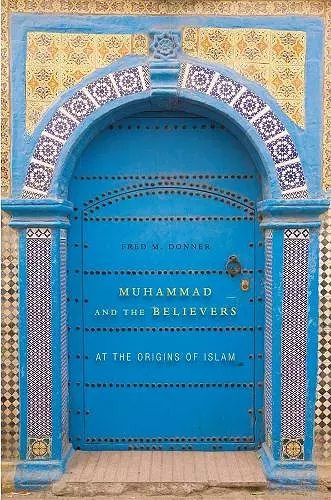Muhammad and the Believers
At the Origins of Islam
Format:Paperback
Publisher:Harvard University Press
Published:7th May '12
Should be back in stock very soon

Donner is one of the leading scholars of early Islam in the world. No other book I know of distills the often highly arcane and dispersed stuff of scholarship on the first century of Islamic history into such an accessible narrative account that, in addition, offers a compelling new interpretation on the formation of Islamic confessional identity. A tremendous achievement. -- Ahmet Karamustafa, Washington University in St. Louis This is an invaluable book. Not only does it provide a sane and lucid guide to the origins of Islam, a topic that is currently more mired in controversy than any other in the entire field of ancient history, but it is also a stimulating and original work of scholarship in its own right. -- Tom Holland, author of Millennium
Offers a vision of how Islam first evolved. This title argues that the origins of Islam lie in what we may call the Believers' movement begun by the prophet Muhammad - a movement of religious reform emphasizing strict monotheism and righteous behavior in conformity with God's revealed law.
The origins of Islam have been the subject of increasing controversy in recent years. The traditional view, which presents Islam as a self-consciously distinct religion tied to the life and revelations of the prophet Muhammad in western Arabia, has since the 1970s been challenged by historians engaged in critical study of the Muslim sources.
In Muhammad and the Believers, the eminent historian Fred Donner offers a lucid and original vision of how Islam first evolved. He argues that the origins of Islam lie in what we may call the "Believers' movement" begun by the prophet Muhammad—a movement of religious reform emphasizing strict monotheism and righteous behavior in conformity with God's revealed law. The Believers' movement thus included righteous Christians and Jews in its early years, because like the Qur'anic Believers, Christians and Jews were monotheists and agreed to live righteously in obedience to their revealed law. The conviction that Muslims constituted a separate religious community, utterly distinct from Christians and Jews, emerged a century later, when the leaders of the Believers' movement decided that only those who saw the Qur'an as the final revelation of the One God and Muhammad as the final prophet, qualified as Believers. This separated them decisively from monotheists who adhered to the Gospels or Torah.
Donner is one of the leading scholars of early Islam in the world. No other book I know of distills the often highly arcane and dispersed stuff of scholarship on the first century of Islamic history into such an accessible narrative account that, in addition, offers a compelling new interpretation on the formation of Islamic confessional identity. A tremendous achievement. -- Ahmet Karamustafa, Washington University in St. Louis
This is an invaluable book. Not only does it provide a sane and lucid guide to the origins of Islam, a topic that is currently more mired in controversy than any other in the entire field of ancient history, but it is also a stimulating and original work of scholarship in its own right. -- Tom Holland, author of Millennium
Donner presents the intriguing view that the early Islamic movement, as presided over by Muhammad, actively included Jews and Christians in the flock as part of a general monotheistic community. It was only later, after Muhammad's death, that a new generation of Muslims began ritualizing Islam with its own distinctive practices, such as the hajj (pilgrimage) and the five daily prayers...He raises many original points, gleaning evidence from everything from coinage to original source documents. Questioning longstanding stereotypes, he argues (and proves) that Muslims are not, by nature, anti-Jewish and also that, based on archeological evidence, Muslims did not routinely tear down churches. The early Muslims, though brutal in war, created a sophisticated and organized civil system. For those curious about Islam's beginnings, no book is as original and as evenhanded as this succinct read. * Publishers Weekly *
In Muhammad and the Believers: At the Origins of Islam, Donner takes a fresh look at the heart and soul of Islamic history. -- Joseph Richard Preville * Saudi Gazette *
A learned and brilliantly original, yet concise and accessible study of Islam's formative first century...Donner's explanation of the process by which Muslims came to define themselves is both fascinating and enlightening. -- Max Rodenbeck * New York Times *
It is an excellent introduction to how and why the faith was born, and explains its proliferation in the Middle East and beyond...Donner uses the original text of the Qur'an and other source materials dating from the same period to piece together the history of the faith. What quickly becomes clear is that Islam, and what it means to be a "Muslim," have both changed dramatically since the early days...Muhammad and the Believers is full...of intriguing questions and challenges readers to reconsider what they think they know about Islam...[It's] a rewarding read. -- Dan Sampson * culturemob.com *
Donner is to be commended for posing questions that many mainstream scholars have chosen to leave aside. -- Malise Ruthven * New York Review of Books *
Provocative and accessible...Donner's vision of an "ecumenical Islam" is thought-provoking...Donner's overarching thesis in Muhammad and the Believers is convincing. It sheds light on a world far more fluid and confused than the one we have come to expect from the usual storyline. -- Christian C. Sahner * Times Literary Supplement *
- Nominated for James Henry Breasted Prize 2010
- Nominated for Distinguished Book Award - Sociology of Religion 2011
- Nominated for Award for Excellence in the Study of Religion 2011
- Nominated for Albert Hourani Book Award 2011
ISBN: 9780674064140
Dimensions: unknown
Weight: unknown
304 pages